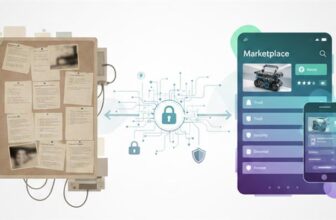
In the modern retail business, security and efficiency are of utmost importance. Traditional methods of securing retail systems, such as passwords, have become increasingly inadequate due to their vulnerabilities and inefficiencies. Retailers are now seeking more advanced technologies to secure their operations and enhance customer experiences. Radio Frequency Identification (RFID) is a prime example of this technology. This article explores why retailers must move away from passwords and how RFID technology, particularly through RFID readers, can revolutionize the retail industry.
The Problems with Passwords in Retail Business
- Security Vulnerabilities
Passwords are a common target for cyber-attacks. Weak passwords, reused passwords, and phishing attacks can easily compromise retail systems. Once hackers gain access, they can steal sensitive customer information, manipulate inventory data, or disrupt operations.
- Operational Inefficiency
Managing passwords is cumbersome and time-consuming. Employees need to remember multiple passwords, which often leads to password fatigue. Frequent password resets and lockouts can hinder productivity, causing delays and frustration among staff.
- Compliance Issues
Many regulatory standards now require stronger authentication methods beyond just passwords. Retailers who rely solely on passwords may struggle to meet compliance requirements, risking fines and reputational damage.
How RFID Technology Enhances Retail Security and Efficiency
RFID (Radio Frequency Identification) technology offers a more secure and efficient alternative to passwords. Here’s how RFID technology, especially through the use of RFID readers, can benefit the retail industry:
- Enhanced Security
RFID tags and readers provide a robust security framework. Each RFID tag has a unique identifier that is nearly impossible to replicate. When an RFID reader scans a tag, it can verify the identity of an item or person without the risk of password breaches. This reduces the likelihood of unauthorized access and ensures that only authorized personnel can access sensitive areas or systems.
- Streamlined Access Control
RFID technology simplifies access control within retail environments. Instead of using passwords to access systems or physical spaces, employees can use RFID-enabled badges or cards. This allows for quick, secure access, reducing the time spent on authentication processes. For instance, an employee can simply swipe their RFID badge to enter a secure area or log into a system, eliminating the need for remembering and entering passwords.
- Improved Inventory Management
RFID readers can significantly enhance inventory management. Unlike barcode systems, RFID tags do not require line-of-sight scanning and can be read from a distance. This allows for rapid and accurate inventory counts, reducing the time and labor involved in manual inventory checks. Additionally, RFID technology can track inventory in real time, helping retailers maintain optimal stock levels and prevent theft.
- Seamless Integration with POS Systems

RFID readers can be integrated with point-of-sale (POS) systems to streamline transactions. RFID-enabled items can be quickly scanned at checkout, reducing wait times and improving the overall customer experience. Furthermore, RFID technology can facilitate secure, contactless payments, enhancing security and convenience for customers.
- Enhanced Customer Experience
RFID technology can personalize the shopping experience. For example, RFID-enabled loyalty cards can provide customers with personalized offers and discounts based on their purchase history. RFID readers can also help retailers track customer preferences and behavior, allowing for targeted marketing and improved customer service.
- Compliance and Data Integrity
Using RFID technology helps retailers meet compliance requirements for data security and access control. RFID systems provide an audit trail of access and transactions, ensuring transparency and accountability. This can be particularly useful for regulatory audits and internal reviews, ensuring that retailers maintain high standards of data integrity and security.
Implementing RFID Technology in Retail
- Choosing the Right RFID System
Retailers need to choose an RFID system that fits their specific needs. Factors to consider include the type of RFID tags (passive, active, or semi-passive), the range of the RFID readers, and the integration capabilities with existing systems. Consulting with RFID experts can help retailers select the best solution for their operations.
- Training Staff
Proper training is essential for the successful implementation of RFID technology. Employees need to understand how to use RFID readers and tags effectively. Training should cover the benefits of RFID, how to handle RFID-enabled items, and the security protocols associated with RFID technology.
- Integrating with Existing Systems
Integrating RFID technology with existing retail systems, such as inventory management and POS systems, is crucial. This ensures a seamless transition and maximizes the benefits of RFID technology. Retailers may need to work with IT specialists to ensure smooth integration and address any technical challenges.
- Monitoring and Maintenance
Regular monitoring and maintenance of RFID systems are necessary to ensure optimal performance. Retailers should establish protocols for checking the functionality of RFID readers and tags, updating software, and addressing any technical issues promptly.
Conclusion
Passwords have long been a standard security measure in the retail industry, but their vulnerabilities and inefficiencies make them less suitable in today’s retail environment. RFID technology offers a more secure, efficient, and customer-friendly alternative. By adopting RFID readers and tags, retailers can enhance security, streamline operations, and provide a superior shopping experience. Embracing RFID technology is not just a step towards modernization; it is a critical move for retail businesses’ future success and sustainability.







